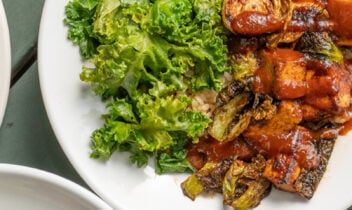Vegetarian Kids
So, your kid wants to be a vegetarian. Sometimes teenagers who are exploring their independence will decide not to eat meat. Though it may be a challenge for you to cope with this decision, don’t panic! There are health benefits that come from following a well-planned vegetarian diet. We’re here to help you learn about and understand this important decision.
Questions you may have
How can I adjust to cooking meals that please everyone now?
What can I do to make sure my child still receives proper nutrition?
Answers
Healthy Characteristics of Any Diet
Types of Vegetarians
At-Risk Nutrients
Support Your Child’s Decision
Educate Yourself and Your Family
Healthy Characteristics of Any Diet
Provides needed nutrients
High in fiber
Low in fat and cholesterol
Conducive to maintaining a healthy weight
Types of Vegetarians
All vegetarians eat fruits, vegetables, grains, dried beans and peas, nuts, and seeds. What distinguishes the types of vegetarians is the absence of certain animal products. Below is a list of what each type WILL eat.
Lacto-ovo-vegetarian: dairy and egg products (best vegetarian choice for growing teens)
Lacto-vegetarian: dairy products, but not eggs
Ovo-vegetarian: eggs, but not dairy products
Pesci-vegetarian: fish
Semi-vegetarian: fish and poultry
Vegan*: food from plant sources; no eggs, dairy products, or honey
*Since the vegan diet eliminates all dairy products and eggs, both of which are important sources of nutrients in a vegetarian diet, special attention must be given to your vegan child’s nutrient consumption.
Depending on the type of vegetarian regimen chosen, your child may be at risk for specific nutrient deficiencies. Suggest that s/he take a daily multivitamin/mineral supplement and hone in on these vegetarian options that will provide missing nutrients.
Protein (dairy products, soy milk, eggs, tofu, dried beans, nuts, fish, shellfish, poultry)
Vitamin B12 (dairy products, eggs, fortified soymilk, clams, oysters, tuna)
Vitamin D (dairy products, vitamin-fortified products including orange juice and soymilk)
Calcium (dairy products, dark green leafy vegetables, broccoli, white beans, calcium-fortified products, sardines with bones)
Iron (dried beans, dried apricots, blackstrap molasses, leafy green vegetables, iron-fortified cereals and bread, clams, oysters)
Zinc (wheat germ, nuts, fortified cereal, legumes, oysters, turkey, ricotta cheese, crab)
Eating a vitamin C rich food with iron foods increases iron absorption.
Support Your Child’s Decision
Try not to make your child feel like the “black sheep” of the family. Here are some tips to help you support this decision.
Talk to your child about her/his choice.
- Find out exactly why s/he made this decision.
- Talk about your concerns and ways to eliminate those concerns.
- Discuss ways that you can help.
Join your child – sometimes. Cook a vegetarian meal at least one night a week.
- Your child will appreciate the effort.
- It could be a great way for your family to explore new dishes.
Let your child cook for the family.
- It’s important to allow your child to express her/his individuality during this time.
- Let her/him choose a vegetarian recipe to share with the family once or twice a month.
Keep fruits and vegetables visible in the kitchen.
- It’s a reminder that the family supports your teenager’s decision.
- It may encourage the rest of the family to eat more fruits and vegetables.
Let your child choose the foods s/he eats – within reason. Wanting to prepare her/his own meal when the rest of the family eats chicken or beef, is not unusual.
- Let her/him choose what to eat, but speak up if poor decisions are made.
- Purchase alternative dinner options, such as whole grain pasta or vegetarian patties.
Educate Yourself and Your Family
Purchase vegetarian cookbooks. Keeping them around the house will inspire your child, and the rest of the family, to explore new and exciting recipes.
Talk about nutrient sources. Learn about the importance of those nutrients that are hard to find in a vegetarian diet and share them with your child.
Share experiences and concerns with other moms. Create a great support system by networking with other moms who have vegetarian children, and share different strategies, facts, and recipes that will benefit your child.
1. Gavin ML, Dowshen SA, Izenberg N. Fit Kids: A practical guide to raising active and healthy children – from birth to teens. New York, NY: DK Publishing, Inc.; 2004: 159.
2. Reilly L. Bites of passage: what you need to know when your teen goes vegetarian – includes list of resources. Vegetarian Times. [serial online]. November, 2004. Available from: BNET Business Library. Accessed March 7, 2008.


